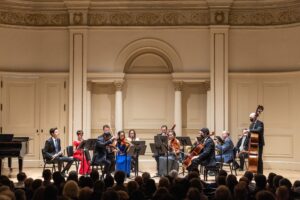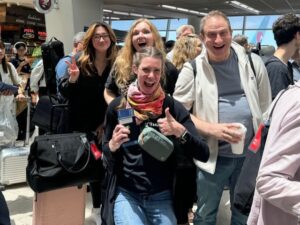Piano Technician Keeps the Met’s Engines Running
By Jennifer Johnson
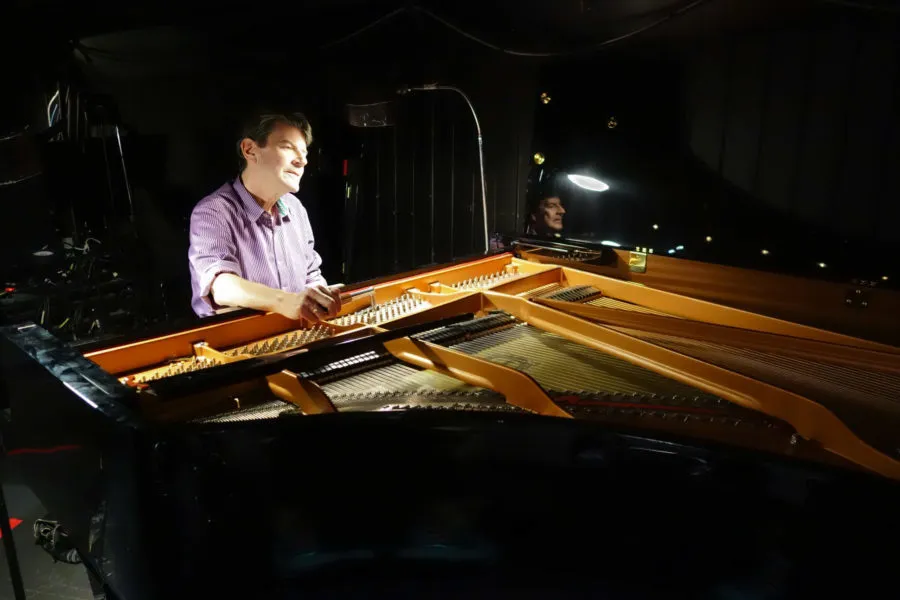
Christopher Kennedy was 14 when he demolished the family piano. And honestly, the old Schiller had it coming. It’d been mocking him – Kennedy could just sense it, with its preposterous pitch and clanky tone – until finally, armed with a tool kit and adolescent resolve, Kennedy removed its front panel and dissected its innards, yanking out strings and keys and taking a sledgehammer to its cast iron plate. For his grand finale, he boxed up the piano bits and dumped them outside.
Nowadays, Kennedy uses his tool kit to keep the piano bits together – and as Resident Piano Technician of the Metropolitan Opera, he has plenty of work to do. The Met’s piano fleet consists of 44 Yamahas, and Kennedy, who retires on December 4, has been their sole, occasionally harried custodian for the past 15 years. “I’m paying penance,” he jokes to those who know about the Schiller’s demise.
Healthy, robust pianos are essential to an opera house. They provide a melodic map for staging rehearsals, and accompaniment for vocal coachings. They play the part of the orchestra when the chorus practices, and they let the dancers in the ballet studio know when to start pirouetting. The Met’s relentless schedule leads many of its employees to refer to it as an “opera factory.” If that’s the case, then the pianos are the engines that keep the conveyor belt running.
On a recent October morning, however, the engines were threatening to stall. With the onset of autumn, the Met had turned on its heating system, and the pianos responded, as they always do, by going haywire. Inside a basement-level coaching studio, Kennedy played a series of rapidly ascending chords on a 7 ½-foot baby grand. “I tuned this one last week,” he said. “But it sounds like it hasn’t been worked on in a month.”
When the heat comes on, the building’s humidity level plummets, causing the wood on the pianos to shrink. And when the wood shrinks, the strings loosen and slip out of tune. For Kennedy, faced with several dozen out-of-tune instruments, it was like starting the season all over.
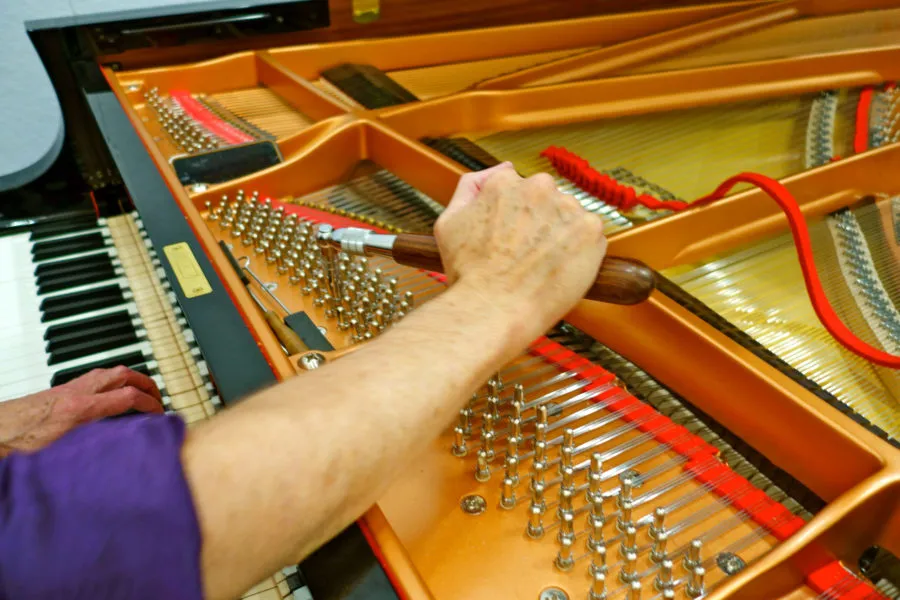
The only remedy was to redo the painstaking work that had unraveled so quickly. Kennedy opened the piano’s lid, interlaced its strings with a red velvet sound dampening cord, and began to play repeated chromatic notes while reaching over the keyboard with a lever to adjust the tuning pins one by one.
Seasonal intonation disasters rank high among Kennedy’s occupational hazards, but at least they are predictable. Others come as surprises – such as the light bulb that smashed before a show into the open soundboard of a piano used in the orchestra, or the grand piano leg that cracked shortly before midnight on the eve of a concert, leaving Kennedy scrambling to find a replacement part at 8 a.m. on a Sunday.
Sometimes Kennedy finds coffee spills on pianos directly beneath the “No Food, No Drink” signs, and if it’s an especially bad day, the coffee will have contained cream and sugar that have blanketed the soundboard in a sticky pool of goo. Other times he hears rattling from within an instrument; inside, he’s found pencils, pens, nails, and even diamond rings. And so, bracing for the unknown, Kennedy arrives before dawn most mornings, a worn black tool satchel in one hand and a travel tea mug in the other, to complete his building rounds before the start of rehearsals.
Ideally, the Met’s pianos stay tuned for two weeks, but when the weather changes, Kennedy checks on them more frequently. “Running my fingers o’er the keys, o’er the i-vo-ries,” he sang to himself while unlocking the door to a second floor music office. Inside, he played a chord progression on a piano he’d tuned the day before to confirm that it was still in good shape. With mock reverence, he crossed himself. “I’m blessing it,” he said.
Religious references come naturally to Kennedy; growing up Catholic, his childhood revolved around the church, where he developed his keyboard skills as an organist for his Boston congregation. From there, Kennedy went to college for English literature, and started writing children’s musicals on the side. “They got a lot of attention,” said Kennedy, “so when I left college, I started focusing on music. I came here to the city – it was 1977 – and I found a very good classical piano teacher, and would practice piano from 10:00am until 4:00pm and then go and work as a waiter. And then I realized I was working with the sister of the piano technician here at the Met, Jim Wooten. I thought, ‘This is interesting. I’d like to know about tuning a piano and what goes on, the mechanics,’ and I got an apprenticeship with him and I fell right into it. It came naturally to me. I mean, it took two years of extensive training, of tuning, and going out in the field and learning new pianos, and making mistakes and doing things I shouldn’t, but I was a natural.”
Kennedy’s apprenticeship with Wooten morphed into a position as his assistant at the Met, and in 2000, when Wooten left, he took over.
An opera house piano technician, Kennedy soon learned, must analyze not just pianos, but the people who use them. There are the pianists, of course, each with a unique touch and preference for tone quality. For most Met accompanists, Kennedy softens the piano hammers – the mechanisms that strike the strings – by loosening their felt casing with a needle. The hammers become hard with constant use, and Kennedy’s “acupuncture” mellows the sound.
Then there are the singers, who sometimes need to be soothed when they learn that the Met’s pianos are tuned to A440 rather than another pitch that they prefer. Operatic temperaments can make this challenging. “You really have to understand people,” Kennedy said.
And there is the piano technician himself: what is he thinking as he adjusts the instruments to meet the performers’ requirements? In 2005, Kennedy explored this question in a one-man show at the Shandelee Music Festival (Catskills, NY), and Christ & St. Stephen’s Church in the Upper West Side. The production, called “Pulling Strings,” revolved around his farcical encounters as a technician, and featured him servicing a piano while ruminating on the personalities he’d come across during his career.
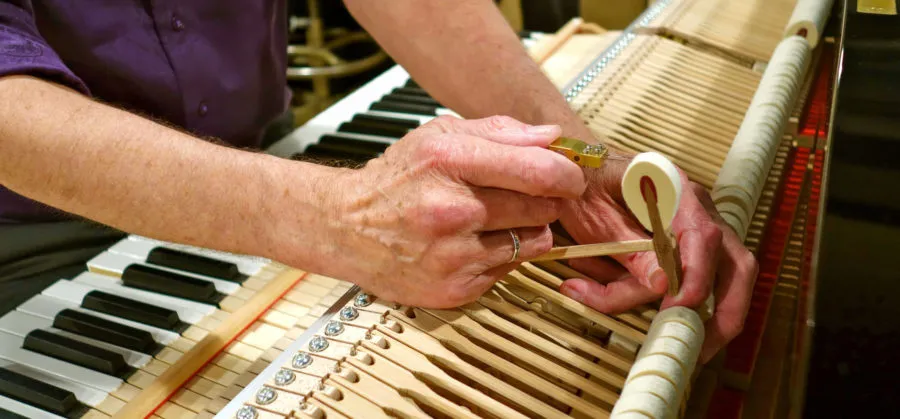
The building was becoming noisy as people showed up for work, and their presence reminded Kennedy that he needed to finish his rounds. He would be back later if an audition was scheduled after rehearsals broke, or if the evening performance required a keyboard instrument. Lulu would open in a week, and for that, he’d return two hours before the curtain to work up both the baby grand in the pit and the upright used for the offstage band. It will be a similar routine later in the season for Elektra – but he’ll be retired by then.
For now, Kennedy’s retirement goals are simple: he is hoping to finally sleep past sunrise, and to spend some time playing – really playing – his own piano in his own home on his own time.
Also, he’s writing another one-man show. Its working title is “Hammered.”


